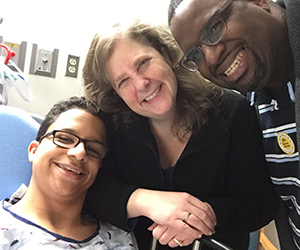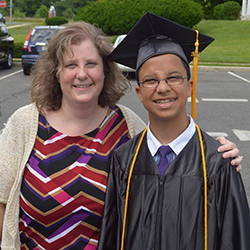Empowering Parents to Improve Early Childhood Systems

Parents are their children’s best advocates. They’re also those who navigate the systems we seek to improve. When we empower parents to partner with us, we can best understand their needs and respond with practical and powerful solutions. Nicole Hopkins, a New Jersey team lead for the NICHQ-led Early Childhood Comprehensive Systems Collaborative Improvement and Innovation Network (ECCS CoIIN), knows firsthand just how effective parent voices can be. Her experience on behalf of her son David uniquely illustrates how parents can be empowered as champions for their children and then go on to empower other families.
In recognition of NICHQ’s commitment to raise up parent voices—an aspect of our change management approach—we’re highlighting Nicole’s story and providing strategies for states interested in putting parent support and parent-partnerships at the forefront of their early childhood improvement efforts.
Nicole’s Story
“David is our miracle,” says Nicole. “If you met him, you wouldn’t know what he has been through.”
In his first eight years of life David was diagnosed with two life-altering genetic diseases, severe food allergies and asthma. He regularly experienced life-threatening fevers, gastrointestinal problems and rheumatological and cardiological complications. His early years were defined by hospitals visits and divided between 17 different specialists.
For Nicole, those early years were defined by advocacy for her son.
“When David was born, I was working as supervisor for a call center. I didn’t know about medical daycare and I didn’t know what supports existed,” Nicole shares. “There were so many specialists saying different things, so many hospital visits, so many hoops to jump through. And it was up to me to keep track of everything. I wanted to keep working at the call center but I needed to be there for my son. His health became my whole world.”
When David was 3 years old, the Hopkins’ school district told Nicole that David would have to be home-schooled. Because of his disability, he would miss out on the chance to learn and grow alongside his peers. This was unacceptable and prompted Nicole to act. She reached out to New Jersey’s Statewide Parent Advocacy Network (SPAN)—a network that empowers families as advocates and partners to improve education and health outcomes for their children—and began her journey as a parent advocate.

“SPAN taught me how to advocate for myself and for my family. And this made all the difference for David. He did attend school. He made honors and he made friends. Because I knew how to advocate for him, he learned how to advocate for himself.”
Nicole’s success as a parent advocate didn’t stop with David. She became a Family Resource Specialist at SPAN for over 5 years, helping other parents with children with medical disabilities. Eventually, she joined the ECCS initiative and is now working to improve early childhood systems across her state.
And as for David? “He starts college this fall,” says Nicole. “It’s five hours away and that’s scary for me. But then I remember that he’s the same person who finished his National Honor Society Application while in the hospital. I remember that everything I did was so he could be successful. And I know he’s going to thrive.”
Interested in hearing from other mothers about their experiences advocating for their children? Here, one mother tells how a school shooting inspired her work to improve social-emotional health during early childhood. Or, read this story about a mother who navigated a complex system to get her son the screening he needed.
Nicole’s experience, not just on behalf of her son, but on behalf of other parents, shows just how much of a difference a parent voice can make. It also shows why we need to support parents as they try to navigate early childhood systems. During David’s first three years, Nicole was on her own trying to figure out what was best for her son in terms of clinical care, homecare, childcare and eventually school. Now, as a key member on New Jersey’s ECCS CoIIN team, Nicole is working to help ensure that other parents have access to the supports they need.
Below, we’ve provided some of the key strategies New Jersey is using to empower parents and spark the passion and the endurance needed to drive change in early childhood systems.
A Multi-Pronged Approach
New Jersey leverages a multi-pronged approach that starts by providing families with both home- and community-based resources and education. New Jersey’s Central Intake Hub leads this effort, handling referrals and improving care coordination. Families referred to home visiting programs have tailored supports brought right into their living rooms, from advice on developmental promotion activities, like reading and singing, to information on accessing programs like Head Start childcare.
“These programs [home visiting and Head Start] go a long way in supporting eligible families,” says Ericka Dickerson, New Jersey’s ECCS CoIIN team lead, “but we also want to make sure there are resources in place for families who may not qualify for them. That’s where our community-based programs, specifically our Family Success Centers, come into play.”
New Jersey describes their Family Success Centers as “one-stop shops” that proactively connect families with outside services, such as transportation or housing assistance, while also providing educational resources and support. From ongoing community events, such as music nights and dinners, to instructional webinars and seminars for parents, the centers serve as community hubs for promoting children’s health.
“We have at least one Family Success Center in each county and they’re open to everyone. Between these centers and our home visiting programs, we really can make sure all families have the tools they need to help their children succeed,” says Dickerson. “Parents shouldn’t ever have to feel powerless or alone.”
Having parents as equal partners elevates improvement efforts. But recognizing the importance of their role only goes so far.
“We need to give them the resources and tools to become parent advocates and make sure their voices are heard. New Jersey’s approach is exciting because it does exactly that,” says ECCS CoIIN Project Director Zhandra Levesque, MPH.”
Parent-community advisory boards, called County Councils for Young Children (CCYC), are available in each of New Jersey’s 21 counties. CCYCs bring parent partners, community leaders and service providers together to make recommendations on educational and children’s health improvement efforts in their counties. These same recommendations, all of which stem from a set of diverse parent voices, ultimately inform future policy and funding decisions across the state.
CCYCs do more than give parents a seat the table though; they also connect parent partners with SPAN, the statewide advocacy network that first empowered Nicole as a parent partner. Through this network, parent partners receive training and technical support so that they feel empowered in their role as champions for their children and champions for other parents.
“Ultimately, New Jersey’s structure is all about investing in families,” says Levesque, “whether that means empowering them in their homes, communities or at the state level. It’s a structure that provides families with a path for empowerment, the same path that Nicole took.”
Are you working to improve early childhood outcomes in your state or community? Sign up for NICHQ news to find out more best practices and lessons learned as the ECCS CoIIN work progresses.
